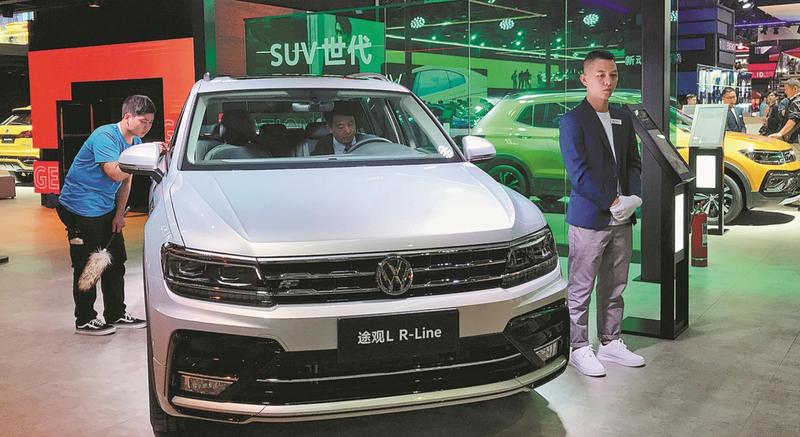 SAIC Volkswagen presents its Tiguan L SUV at the Guangzhou auto show in 2019. (LI FUSHENG / CHINA DAILY)
SAIC Volkswagen presents its Tiguan L SUV at the Guangzhou auto show in 2019. (LI FUSHENG / CHINA DAILY)
Vehicle sales in May soared 14.5 percent year-on-year in China as customer confidence was boosted by the country's ability to mitigate the coronavirus pandemic, according to the country's leading automotive industry association.
Companies are resuming operations and the government is rolling out favorable measures, so customers’ confidence has been further boosted.
Chen Shihua, deputy secretarygeneral of the China Association of Automobile Manufacturers
A total of 2.19 million vehicles were sold last month, following sales growth first spotted in April, according to statistics from the China Association of Automobile Manufacturers.
Of them, 1.67 million were passenger vehicles, up 7 percent from the same month last year.
It marked the first rise in the sector almost in a year, evidence that the market is recovering from the pandemic that almost devastated the sector in the past several months and still rages in other parts of the world.
Carmakers are revving up production as well. The 2.19 million vehicles made in May represented an increase of 18.2 percent from the same month last year.
The CAAM said that the 23 carmakers' 204 plants across the country had resumed operations by Thursday.
ALSO READ: China's vehicle sales rebound
Chen Shihua, deputy secretary-general of the association, said the rise in May sales is primarily the result of the pent-up demand in recent months.
"Companies are resuming operations and the government is rolling out favorable measures, so customers' confidence has been further boosted," Chen said.
The government's stimuli on new car sales and generous discounts at dealerships were also contributing factors.
Dozens of cities in the country are encouraging car sales with a stimuli of thousands of yuan on certain models, usually those made in those cities.
Statistics from the association show that Japanese and German brands expanded their market share in the month, while companies from France, the United States and China lost ground.
FAW-Volkswagen topped the list of carmakers in China in May. It sold 186,777 vehicles under its Volkswagen, Audi and Jetta brands in May, up 22 percent year-on-year.
GAC Toyota had its best-ever monthly sales in May, with 68,518 sold, up 32 percent year-on-year.
The Japanese carmaker's other joint venture FAW-Toyota delivered over 72,000 vehicles in the same month, up 2 percent.
 SAIC Volkswagen presents its Tiguan L SUV at the Guangzhou auto show in 2019. (LI FUSHENG / CHINA DAILY)
SAIC Volkswagen presents its Tiguan L SUV at the Guangzhou auto show in 2019. (LI FUSHENG / CHINA DAILY)
Mazda's joint venture with Changan sold 14,326 units last month, soaring over 50 percent year-on-year.
Sales in the commercial vehicle sector rebounded even higher. In May, sales totaled 520,000, up 48 percent year-on-year as workers are returned to their offices.
Total sales in the first five months reached 1.85 million, down 1 percent year-on-year.
Yet the new energy vehicle sector is yet to turn positive. A total of 84,000 units were sold in May, still a 25.8 percent fall from the same month in 2019. Sales from January to May were 295,000, a 40 percent nosedive year-on-year.
Warren Buffett-backed BYD sold 11,325 vehicles in May, only half of the figure of the same month last year.
But some carmakers are having more success. Tesla was the top-selling electric car brand with 11,095 vehicles.
The US company began deliveries from its massive new Shanghai factory around the start of the year. Monthly registrations of new Tesla vehicles in China have fluctuated this year amid the virus, from a low of 2,314 in February to a high of 12,710 in March, according to data from China Automotive Information Net.
Chinese electric car startup Nio delivered 3,436 vehicles last month, representing a 216 percent growth year-on-year. Its total deliveries this year totaled 10,429.
After growing rapidly for several years, electric car sales have lost momentum since the government moved to limit subsidies in mid-2019.
The pandemic also hurt demand and falling oil prices have made gasoline vehicles more competitive.
The government still considers electric cars a priority and has added a slew of fresh stimulus measures to help the industry recover.
UBS said the pandemic will produce little long-term impact on the sector.
"It may have affected some carmakers' financing," said UBS auto analyst Paul Gong. "But long-term goals, like China's goal of electric cars accounting for 25 percent of the country's total sales by 2025, are immune to the pandemic."
READ MORE: Vehicle sales targets slashed in wake of virus outbreak
China's vehicle exports remained at a lower level as well. Statistics from the China Association of Automobile Manufacturers showed that merely 49,000 vehicles were sold in May, down 37.4 percent year-on-year.
From January to May, vehicle exports totaled 323,000, falling 17.5 percent year-on-year.
Chen said the fall in exports was primarily because of the waning demand overseas because of the pandemic.
"The demand is yet to recover in overseas markets, and export-oriented companies are not safe now," Chen said.
He estimated that vehicle exports will drop by 200,000 units this year, from about 1 million in 2019, as the coronavirus erodes global demand.


